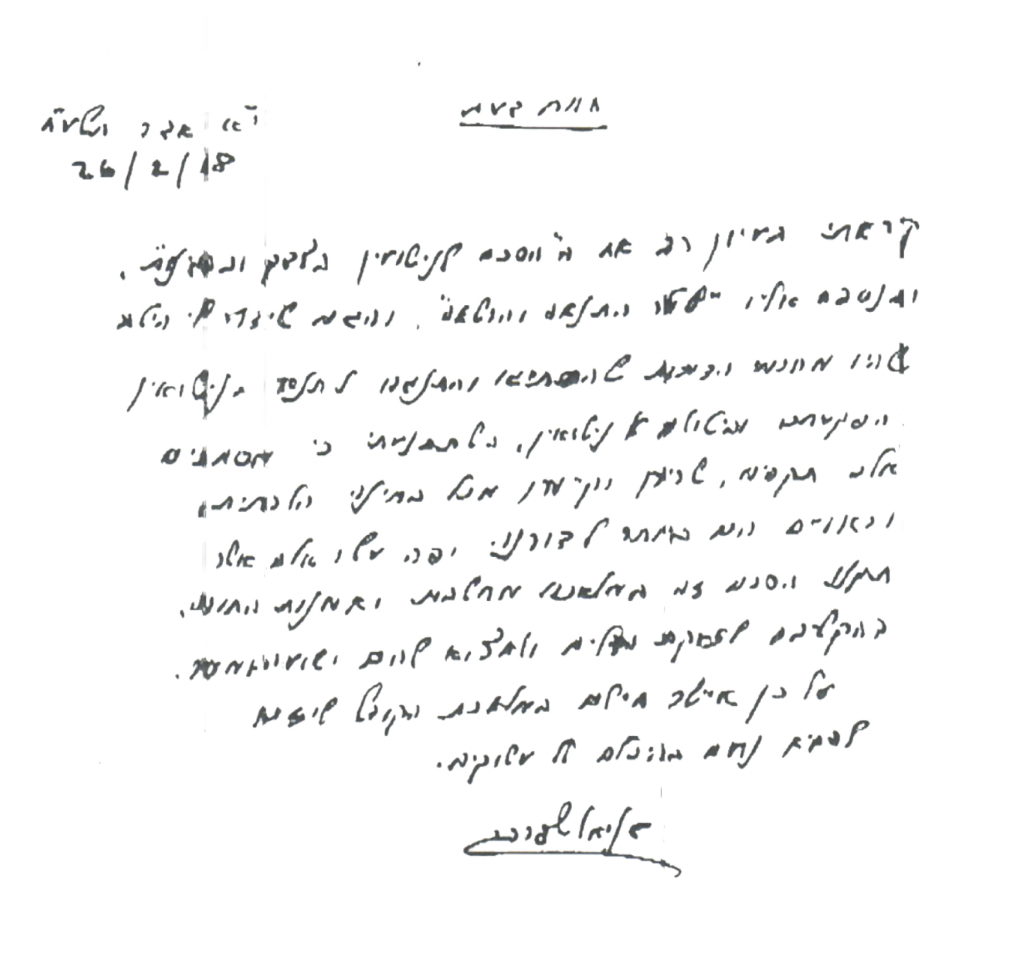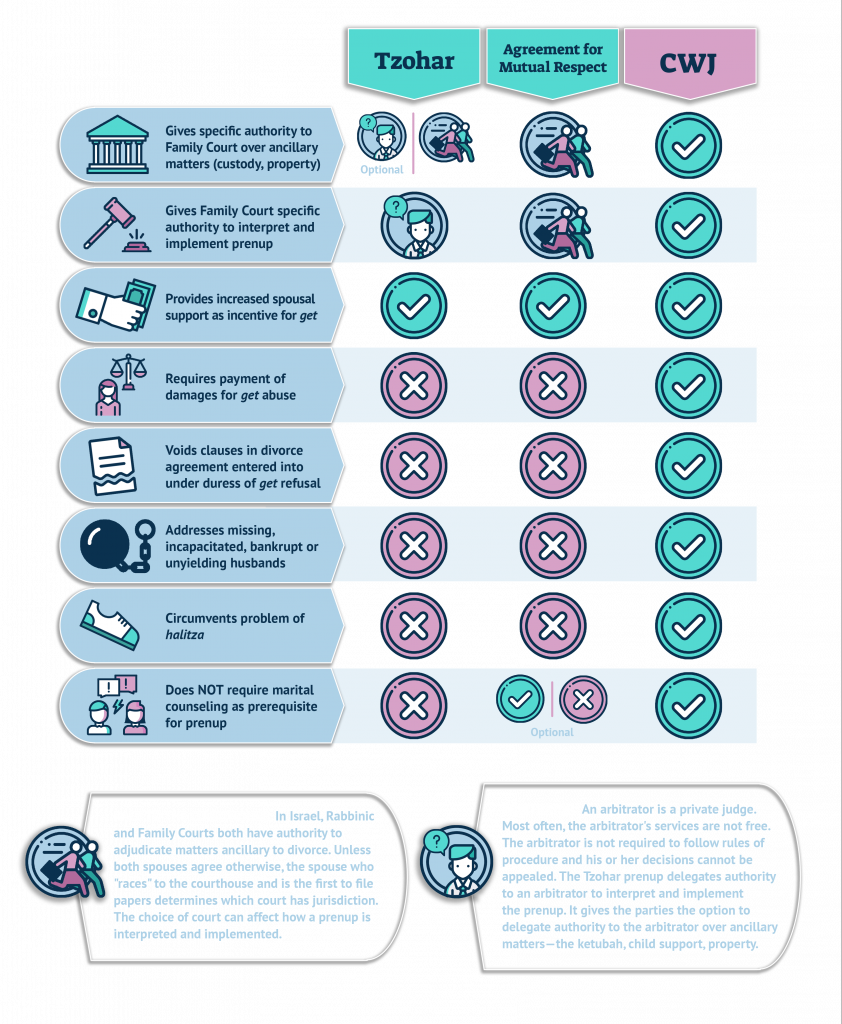The Agreement for a Just and Fair Marriage
Halachic Prenuptial Agreement
What is the CWJ Agreement for a Just and Fair Marriage?
The Agreement for a Just and Fair Marriage, CWJ’s halakhic prenuptial agreement, is meant for Jewish couples who marry in accordance with halakha (Jewish law). It offers comprehensive protection from marital captivity using both legal and halakhic tools.
The CWJ prenup adresses the halakhic challenges of both get refusal (when a spouse is unwilling to grant a get) and aginut (when a spouse is unable to grant a get).
Rabbinic Approval
“I have done a close reading of CWJ’s Agreement for a Just and Fair Marriage, as well as the halakhic addendum—the shtar—and I am persuaded that these documents are halakhically sound and applicable, and are appropriate for our time.”
—Rabbi Daniel Sperber

Frequently Asked Questions
The CWJ prenuptial agreement is suitable for all couples who enter into Jewish marriage, whether they marry under the auspices of the Israeli Rabbinate or in a private halakhic ceremony in Israel. It is also suitable for couples who marry in halakhic ceremonies in Israel and obtain a civil marriage certificate abroad.
The CWJ prenup contains legal and halakhic mechanisms that protect a couple from both get recalcitrance (when a spouse is unwilling to give a get) as well as aginut (when a spouse is physically unable to give a get).
According to Jewish and Israeli law, a woman is not divorced until her husband delivers a Jewish bill of divorce—a get—to her. If he refuses, she remains captive in marriage indefinitely. If a woman refuses to accept a get, the husband may also have difficulty remarrying. The CWJ prenup protects both men and women from get recalcitrance.
The prenup comprises two parts: the civil agreement (pages 1-3) and a halakhic bill (pages 4-5):
Civil Agreement
The civil agreement prevents get refusal and extortion as follows:
Clause 1: Authority to Family Court: The prenup authorizes the Family Court (civil court) to have jurisdiction over any potential divorce proceedings between the parties, aside from the actual get ceremony in the Rabbinical Court. This authorization includes enforcing the prenup itself, as well as ruling on ancillary divorce matters like division of property, custody and child support.
Clause 2: Voiding Extortionate Agreements: The prenup neutralizes extortion by voiding unconscionable agreements made under the threat of get refusal.
Clause 3: Increased spousal support: The party wishing to divorce must notify the other party. If a get is not granted within a year from this date, the party delaying the divorce–be it the husband or the wife–will be obligated to pay the other party $2000 per month or 50% of their monthly salary, whichever is the higher sum.
Clause 4: Compensation for damages: The prenup defines get refusal as a form of abuse and grants authority to civil courts to award monetary compensation for damages incurred.
Halakhic Bill
The halakhic part of the agreement sets terms upon which a rabbinic court can declare a Jewish marriage null. It employs the halakhic concept of tna’im bekiddushin–conditions which uphold a marriage.
This mechanism can be invoked in the event of tragedy, like if a husband falls into a permanent coma or has gone missing in war. It also provides a solution for severe get-refusal cases that cannot be overcome by other means, such as by sanctions by the Rabbinic Court or by an agreement.
This halakhic bill is enforced in a rabbinic court. It can be enacted by a spouse petitioning a rabbinic court after the couple has not lived under the same roof for at least 18 months.
The halakhic bill also includes the option for a marriage to be annulled in the event a woman requires but cannot obtain ‘chalitzah’ (chalitzah is an exemption from levirate marriage–the halakhic obligation of a widow’s brother-in-law to marry her, if her husband has died childless. If the chalitzah ceremony is not performed, the woman cannot remarry).
Download and print out the prenup. For part one, each partner initials the corner of each page and signs in full on page 3. There is no need to bring the agreement to a notary or court of law. While it is preferable to sign the agreement in the presence of an attorney who can authenticate the signatures, the agreement is still valid without it. CWJ attorneys can provide this service to you free of charge.
Part two, the halakhic bill, must be signed by in the presence of two kosher witnesses: two religiously observant men who are not related to each other nor to either of the spouses.
Both parts of the agreement must be signed before the wedding ceremony. It can be signed several weeks before or immediately prior. The halakhic part of the agreement (pages 4-5) may be signed during the marriage ceremony itself, as long as it is signed before the chuppah ceremony begins.
After signing the prenup, scan it and send us a digital copy for safekeeping by clicking on the upload button at the bottom of this page. Keep the original in a safe place, such as with your ketubah. That’s it. Mazal tov!
Married couples who have not signed the prenup are encouraged to sign CWJ’s English Halachic Postnup, which includes a civil agreement to prevent get refusal, as well as the Pledge of Compassion and Dignity, a halachic addendum that which prevents aginut in the event of a tragedy.
The CWJ prenup comprehensively addresses all halakhic problems that may arise at the dissolution of a marriage. This includes not only willful get refusal, but also aginut (when a man is unable to grant a get), mamzerut (halakhic illegitimacy of children born from forbidden unions) and chalitzah (exemption from levirate marriage in the event a husband dies childless).
Most agreements only address get refusal by stipulating monthly financial payments. They do not specifically prevent extortion in exchange for the get. They do not address issues of aginut, which may occur if a husband goes missing, is captured in war or becomes medically or mentally incapacitated. Additionally, many agreements are ineffective in cases of extreme get refusal, where men prefer to incur debt or suffer severe sanctions—such as incarceration—rather than grant their wives a get. The CWJ prenup is the only prenup that includes specific conditions to solve all such issues.
Another significant difference between this agreement and others is the method by which it is enforced. The CWJ prenup specifically authorizes the Family Court to enforce the legal portion of the CWJ prenup. Other prenuptial agreement options leave this question open, or appoint a private arbitrator instead.
Yes. We recommend signing both portions for the most comprehensive protection, but it is possible to sign only the civil portion or only the halakhic portion of the prenup.
Of course. In the introduction, the prenup states specifically that reconciliation is preferred and encouraged. However, unlike other prenups, it does not mandate marriage counseling as a prerequisite for utilizing the prenup. We believe that a couple should choose marriage counseling at their own initiative and terms, and certainly not under the threat of get refusal.
The CWJ halachic prenup has the halachic backing of Rabbi Daniel Sperber, whose approbation can be found here. The CWJ prenup is also officially endorsed by all of the rabbis at Chuppot, headed by Rabbi Aaron Leibowitz (all couples who marry via Chuppot them are required to sign our prenup). Other rabbis who have used our halachic document or support its use include Rabbi David Bigman, Rabbi Shlomo Riskin and Rabbi Yoni Rosensweig.
Most often, the agreement is effective before it even reaches the stage of enforcement. It acts as deterrent to withholding the get in the first place.
The first part of the agreement (pages 1-3) is enforced in a civil court, like any other legal contract. This will take care of the vast majority of get refusal cases, leaving only the most extreme cases to be addressed by the halakhic part of the agreement.
The halakhic part of the agreement (page 4-5) is enacted in a rabbinic court. While no practical cases have sought to implement it in the Rabbinical Court so far, we believe that CWJ’s halakhic bill would be utilized by the Rabbinical Court in the event of extreme circumstances of aginut. In the past, the Rabbinical Courts have sought out lesser-used mechanisms, such as get zikui, to solve particularly deadlocked cases. In cases where the Rabbinic Court has little options, the CWJ prenup can provide a welcome opportunity for halakhic recourse.
The legal part of the prenup is written in a manner that we expect can be used anywhere. However, because each country has its own contract laws, it is best to review the prenup with a local attorney. The halakhic bill is valid halakhically, regardless of country of enforcement.
What makes the CWJ Agreement for a Just and Fair Marriage the most comprehensive halakhic prenuptial agreement?

Upload a signed agreement
After you’ve signed the agreement, scan and upload a digital copy to our site. Keep your original agreement in a safe place. That’s it!
Still have questions?
Set up a free prenuptial agreement consultation with us here.
